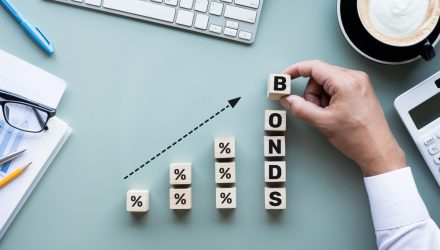The Bloomberg U.S. Aggregate Bond Index is one of the most widely observed fixed income gauges in the world. And it serves as the benchmark for a variety of exchange traded funds and index funds. Additionally, it is the index many active bond managers attempt to beat.
However, other approaches to aggregate bond exposure could serve fixed income investors well. Consider the WisdomTree Yield Enhanced U.S. Aggregate Bond Fund (AGGY). AGGY, which turns nine years old in July, follows the Bloomberg U.S. Aggregate Enhanced Yield Index. As its name implies, that index enhances the yield proposition offered by the Bloomberg U.S. Aggregate Bond Index.
AGGY lives up to that billing. The WisdomTree ETF sports a 30-day SEC yield of 4.70% or 44 basis points above the comparable yield on the largest ETF following “the agg.” AGGY offers other advantages. For example, the ETF beat its traditional counterpart by a modest margin over the past two years while displaying less annualized volatility.
More AGGY Advantages
AGGY has nearly $922 million in assets under management, indicating plenty of advisors and investors have embraced the fund’s value-add proposition, but a case can be made that AGGY deserves more attention than it has received to date.
In fact, AGGY is relevant here and now due to its elevated exposure to BBB-rated corporate bonds – investment-grade fare with attractive yields.
“Following a decline to some of the lowest levels in December 2023, BBB-rated industrials spread to A-rated bonds and have tightened in 2024,” noted Behnood Noei, WisdomTree associate director of fixed income. “This shift likely reflects diminishing concerns about a hard-landing scenario driven by positive surprises in U.S. economic data. Despite the substantial contraction year-to-date, the spread ratio between BBB and single-A bonds still trails the significant rally observed since October. As a result, BBBs remain attractive on a relative value basis.”
AGGY could also be pertinent to fixed income investors as 2024 moves along not only amid expectations that the Federal Reserve will eventually lower interest rates but also due to the diverging China policies of President Biden and GOP frontrunner, former President Donald Trump.
As WisdomTree’s Noei pointed out, corporate debt issued by industrial companies with large China exposure underperformed in the run-up to the 2016 presidential election and through much of the Trump Administration.
“As we get closer to Election Day in November, the market will have to digest a lot of policy rhetoric and its impact on different asset classes and industries from both sides of the aisle,” Noei concluded. “There is an abundance of policy differences between the two major candidates. However, there is one clear common ground: China. Both candidates would like to approach trade issues with China with an iron fist policy.”
For more news, information, and analysis, visit the Modern Alpha Channel.








